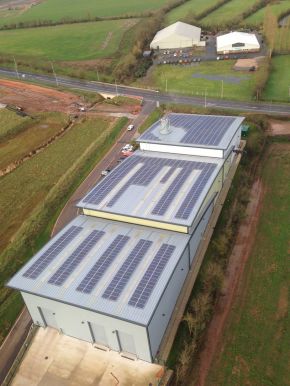
Cranbrook energy centre looks to show how solar thermal and heat pumps can succeed
A low carbon heating project led by E.ON working with the University of Exeter and technology providers SK Solar and Star Renewable Energy has today been awarded a Government research grant to carry out the feasibility work to create a UK-first community-wide energy scheme based on emissions-free renewable energy sources.
The project, to be funded by the Department of Energy and Climate Change (DECC), is based at E.ON’s energy centre in Cranbrook to the east of Exeter will seek to demonstrate how solar thermal panels and heat pumps can replace or work alongside the existing gas-fired district heating scheme to provide a lower cost and significantly lower carbon heating and hot water source.
If initial work and tests are successful this will lead to the construction and testing of the system over a range of live operational scenarios to learn as much as possible about this innovative design.
The existing district heating scheme provides a central source of heat and hot water from the energy centre which is then supplied to homes in Cranbrook and the nearby Skypark commercial complex through a network of super-insulated underground pipes. It will supply the 3,500 new homes in Cranbrook as well as 1.4 million sq ft of industrial space at Skypark.
The project will see the installation of approximately 2,000 sq m solar thermal array on land next to the energy centre as well as a high temperature (>80°C) heat pump.
The ground-mounted panels will collect solar heat to supply the heat pump which will increase the water temperature ready for use in the heating system. Hot water not needed immediately can be stored in a dedicated thermal storage tank which will be installed alongside existing equipment attached to the district heating system.
Jeremy Bungey, Head of Community Energy at E.ON, said: “District heating schemes such as Cranbrook are lower carbon by their very design, and we often see carbon savings of around a quarter compared to traditional home heating such as gas boilers.
“By migrating the energy source from gas-fired combined heat and power plants to renewable energy sources we believe we could see a further significant reduction in carbon emissions and still maintain secure and reliable supplies to our customers.
“This is a demonstration project at this stage but if it proves successful, the integrated technology we are pioneering here could be replicated in existing and new district heating schemes right across the country and would make a significant contribution to easing the impact on the environment which comes from domestic heating.”
Professor Chris Smith, The University of Exeter’s Engineering Director of Research, added: “We’re delighted this innovative research has got the go ahead and are looking forward to working with partners in the project which builds of the Centre of Energy and Environment’s long tern links with district heating at Cranbrook and our renewable energy expertise in Cornwall.”
The Cranbrook energy centre is already fitted with rooftop solar panels and the project will seek to incorporate the electricity generated by those panels and use it to power the heat pump, providing another low or zero carbon energy source to replace mains power.
Phase one of the project will create a detailed design of the integrated system and an assessment of possible energy performance, carbon savings and cost efficiency. If successful, the second phase will see the installation and integration of all the technologies ahead of a full 12 month trial to test the system across different seasons and weather patterns.
The Heat Networks Demonstration SBRI competition was created by DECC to stimulate innovation that will help address cost and performance efficiency challenges related to heat networks, supporting the growth of low carbon heat networks across the country as well as providing real world evidence on reducing costs and improving energy efficiencies.
